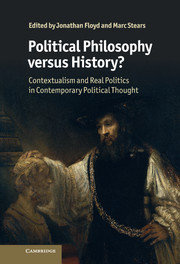 Political Philosophy versus History?
Political Philosophy versus History? Book contents
- Frontmatter
- Contents
- Note on the contributors
- Acknowledgements
- Introduction
- Part I The challenge of contextualism
- 1 Rescuing political theory from the tyranny of history
- 2 From historical contextualism, to mentalism, to behaviourism
- 3 Contingency and judgement in history of political philosophy: a phenomenological approach
- 4 Political philosophy and the dead hand of its history
- Part II The challenge of realism
- Index
- References
3 - Contingency and judgement in history of political philosophy: a phenomenological approach
from Part I - The challenge of contextualism
Published online by Cambridge University Press: 05 June 2012
- Frontmatter
- Contents
- Note on the contributors
- Acknowledgements
- Introduction
- Part I The challenge of contextualism
- 1 Rescuing political theory from the tyranny of history
- 2 From historical contextualism, to mentalism, to behaviourism
- 3 Contingency and judgement in history of political philosophy: a phenomenological approach
- 4 Political philosophy and the dead hand of its history
- Part II The challenge of realism
- Index
- References
Summary
The issues raised in this book go to the heart of an endeavour to do the best we can for ourselves in the light of past experience. In our reasonable moments, none of us would embark on a hazardous course of action without thinking long and hard about problems other individuals had confronted in comparable circumstances. And though our interest in studying history of political philosophy is unlikely to be motivated by quite the same practical urgency, it nevertheless constitutes a repository of the very best thinking that has been recorded, often advanced in exceptionally challenging circumstances. How we should live, what we owe to each other, what are the limits of our tolerance, are questions that can crop up in any conceivable society, understood as a scheme of social co-operation. Not to ask ourselves how such questions were addressed in the past would be the height of practical folly, though we perfectly understand that no two situations are exactly alike. What we have to focus on is the nature of a normative engagement in a variety of circumstances. We need to be clear about what it is to think hard in any conceivable circumstance. Our awareness that circumstances change is a subordinate element in a larger concern to think clearly.
- Type
- Chapter
- Information
- Political Philosophy versus History?Contextualism and Real Politics in Contemporary Political Thought, pp. 65 - 83Publisher: Cambridge University PressPrint publication year: 2011
References
- 6
- Cited by
